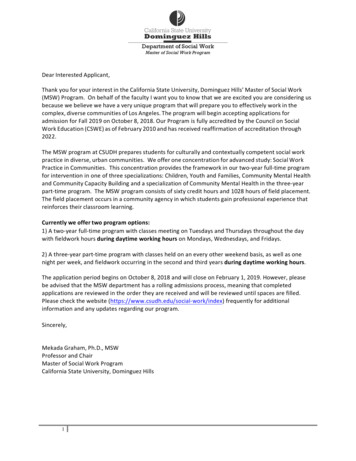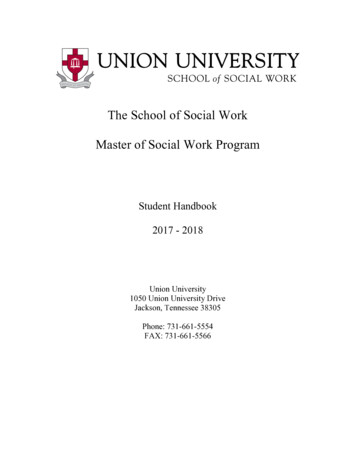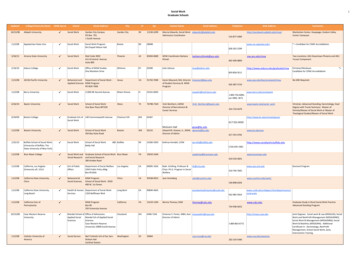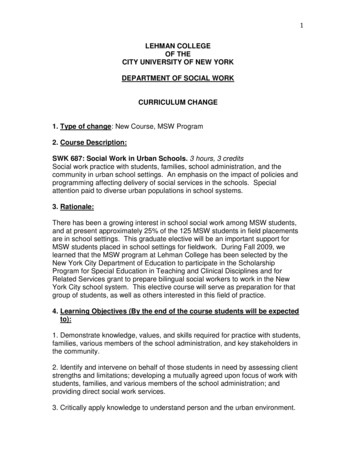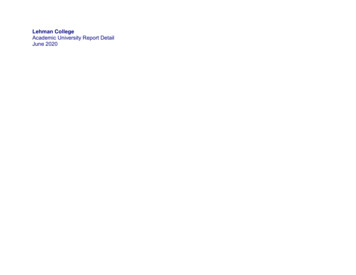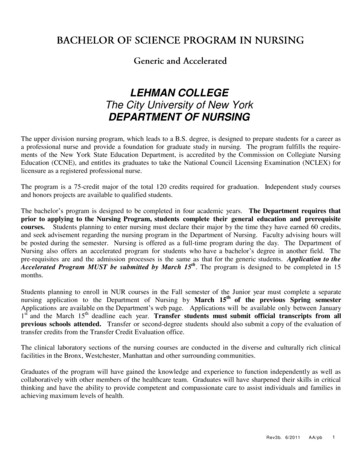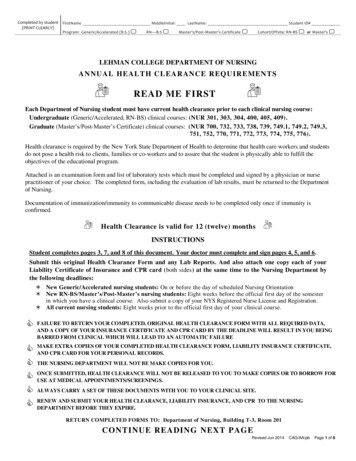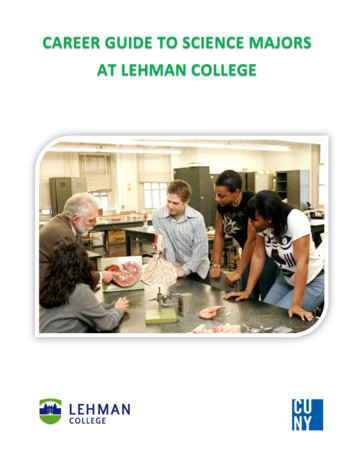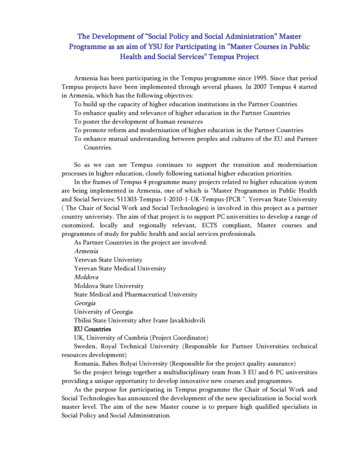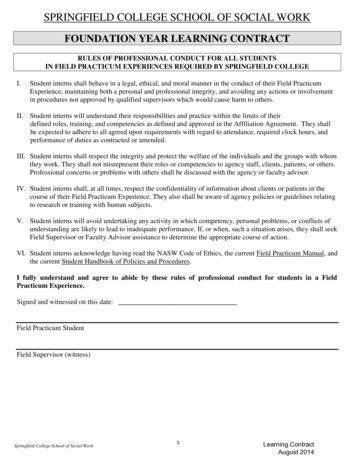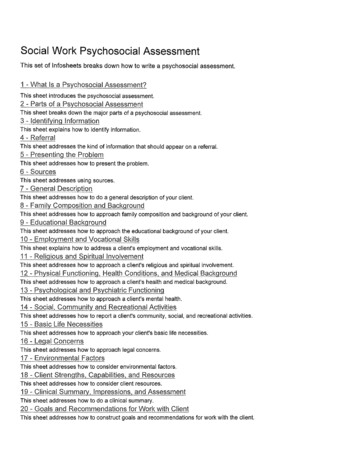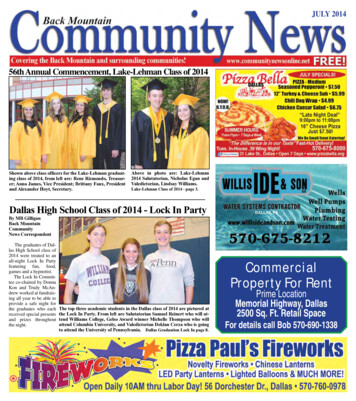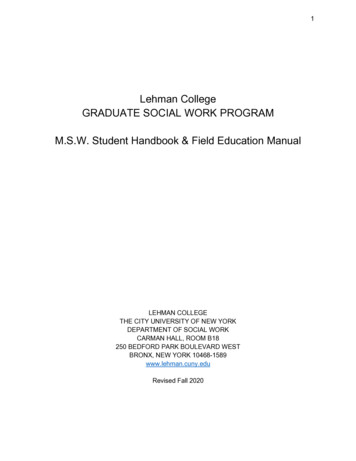
Transcription
1Lehman CollegeGRADUATE SOCIAL WORK PROGRAMM.S.W. Student Handbook & Field Education ManualLEHMAN COLLEGETHE CITY UNIVERSITY OF NEW YORKDEPARTMENT OF SOCIAL WORKCARMAN HALL, ROOM B18250 BEDFORD PARK BOULEVARD WESTBRONX, NEW YORK 10468-1589www.lehman.cuny.eduRevised Fall 2020
2IMPORTANT NOTICE OF POSSIBLE CHANGESThe City University of New York reserves the right, because of changing conditions, to makemodifications of any nature in the academic programs and requirements of the University and itsconstituent colleges without notice. Tuition and fees set forth in this publication are similarlysubject to change by the Board of Trustees of The City University of New York. The Universityregrets any inconvenience this may cause.
3 MSW STUDENT HANDBOOKandFIELD EDUCATION MANUAL TABLE OF CONTENTSSECTION I: OverviewMessage from Faculty and Staff of the Social Work DepartmentIntroduction, Program Overview, & Contact InformationMission of Lehman CollegeMission of the MSW ProgramGoals of the MSW ProgramSECTION II: MSW Student HandbookPart 1: DESCRIPTION OF TRACKSDescription of TracksCurriculum by TrackTrack A: 2-Year Full-timeTrack B: 3-Year Extended Program (ending Spring 2022)Track C: Advanced Standing ProgramTrack D: 3-Year Extended ProgramPart 2: ADMISSIONS POLICIES AND PROCEDURESRequirements for AdmissionAdmission Requirements for All TracksAdmission Requirements for Track C, Advanced StandingAdditional Admissions PoliciesPolicy on Selection of Track and Class SchedulesPolicy on Transfer of Credits to the MSW ProgramPolicy on Life Experience CreditPolicy on Non-Matriculated StatusAdmissions Procedures
4Part 3: ACADEMIC, CONTINUATION AND CLASSROOM POLICIES AND PROCEDURESGrade Appeals, Probation, and Continuation CriteriaGrade Appeals ProceduresAcademic ProbationContinuation in the M.S.W. ProgramG.P.A. Requirement for GraduationClassroom Policies and ProceduresPolicy Regarding Use of Tape-Recorders and Electronic Devices in ClassesRules and Regulations on Campus Conduct; College Policies, Procedures and Regulations; andCUNY Policy on Academic IntegritySocial Work Department Retention Requirements and Procedures for Review and Terminationfor Violation of Professional BehaviorPurpose of the Retention and Review CommitteeComposition of the Retention and Review CommitteeProcedure for ReviewAppeals ProcedurePart 4: ADVISEMENT POLICIES AND PROCEDURESRole of the MSW Graduate AdvisorRole of the MSW Faculty AdvisorRole of the Office of the Graduate Studies AdvisorPart 5: STUDENT PARTICIPATION IN DECISION-MAKING AND IN THE FORMULATION OFPROGRAM AND DEPARTMENTAL POLICIESSocial Work Department MeetingsSocial Work Department Advisory CommitteeInterview of Faculty ApplicantsSocial Work ClubStudent Evaluation of Courses, Fieldwork, and the ProgramPart 6: THE MSW CURRICULUMFoundation Year CurriculumCompetencies and Practice Behaviors of the Foundation YearAdvanced Year CurriculumConceptualization of Advanced Generalist PracticeCompetencies and Practice Behaviors of the Advanced YearOrganization of the CurriculumOptional Certification
5Part 7: COLLEGE RESOURCESAPEXCareer CounselingChild Care CenterCounseling CenterStudent Disability ServicesInformation Technology CenterInstructional Support Services Programs (ISSP)LibraryMSW Academic Support CenterParkingHealth CenterStudent LifeAlumni ActivitiesPart 8: ADDITIONAL TRAINING FOR STUDENTSTraining for Identification and Reporting of Child Abuse and MaltreatmentSECTION III: Field Education ManualPart 1: OVERVIEWField Education OverviewContact InformationPart 2: THE STUDENT IN THE FIELDWORK AGENCYAssignment of Students to Fieldwork AgenciesMSW Fieldwork Educational PlanStudent Responsibilities
6Part 3: THE FIELDWORK AGENCY AND THE FIELDWORK INSTRUCTORCriteria for Selection of Fieldwork AgenciesCriteria for Employment-Based PlacementsCriteria for Field InstructorsTask SupervisionOngoing Professional Opportunities for Fieldwork InstructorsProcess RecordingsSupervisory AgendasClassroom Assignments Related to Fieldwork PlacementMaintaining Field Liaison ContactsGuidelines for Home and Community VisitsCUNY-Agency Affiliation AgreementsThe Fieldwork Seminar and the Faculty AdvisorPart 4: EVALUATIONSFieldwork Instructors’ Evaluation of Students’ PerformanceGrading ProceduresStudents’ Evaluation of Fieldwork AgenciesAPPENDICESAppendix 1. About the National Association of Social Workers (NASW)NASW Code of EthicsAppendix 2. Ethics in Social Work, Statement of PrinciplesInternational Federation of Social Workers (IFSW) andInternational Association of Schools of Social Work (IASSW)Appendix 3. Council on Social Work Education 2015 Educational Policy and AccreditationStandards (EPAS)Appendix 4. Lehman College/CUNY PoliciesAppendix 5. Link to Field Education Documents
7SECTION I: OverviewMessage from Faculty and Staff of the Social Work DepartmentThe faculty and staff of the Social Work Department at Lehman College welcome you to ourMSW Program and welcome our Fieldwork Instructors and Educational Coordinators to FieldEducation. This Handbook provides information students will need as they proceed through theProgram. It should be read carefully and will be discussed in classes and in Fieldwork. TheHandbook contains important information about the policies, procedures, curriculum,governance, and resources that will guide you through the Program.The Appendix to this Handbook includes important links to: The Code of Ethics of the National Association of Social Workers (NASW). It will bediscussed at length in classes and in Field Education. The Code of Ethics is intended toserve as a guide to the everyday professional conduct of social workers. Compliancewith professional behavior, as described in the NASW Code of Ethics, is required of allsocial workers and social work students. Also included is a link the Ethics in SocialWork, Statement of Principles of the International Federation of Social Workers (IFSW)International Association of Schools of Social Work (IASSW), to be used as applicable. The 2015 Council on Social Work Education (CSWE) Educational Policy andAccreditation Standards. CSWE establishes standards that guide undergraduate andgraduate social work education, thereby ensuring high quality professional education. Lehman College and City University of New York (CUNY) policies and procedures. Retention documents used by the Retention and Review Committee, including theCompliance Plan and Agreement and the Field Education Plan and Agreement. Reviewand appeals procedures of the Lehman College MSW Program are included in theStudent Handbook and the Field Education Manual sections. Field Education documents, including the Application for Fieldwork, MSW FieldEducation Plan, Process Recording Form, and Fieldwork Instructors’ Evaluation forms.The Social Work Department is situated within the School of Health Sciences, Human Services,and Nursing. The Social Work Department works cooperatively with and contributes to thesocial work community in the Bronx and other boroughs and neighboring areas.The faculty and staff wish you a very productive and successful educational experience in theMSW Program at Lehman College.
8Program OverviewThe Master of Social Work (MSW) Program at Lehman College prepares social workers toassume positions of leadership in urban public and voluntary sector social service agencies andorganizations. All students in the program complete an Advanced Generalist curriculum anddevelop social work skills in direct practice with individuals, families, groups, and communities,as well as skills in supervision, administration, research and policy practice. The MSW programis registered with the New York State Education Department and is fully accredited by theCouncil on Social Work Education (CSWE).Students who earn their MSW degree will have completed all requirements and be eligible to takethe NYS licensing exam for the Licensed Master Social Worker (LMSW). Students who completethe two-year curriculum and earn their MSW degree will have met the educational requirementsfor the New York State licensing exam for the Licensed Clinical Social Worker (LCSW). AdvancedStanding students, Track C, will need to take one additional course designated as having clinicalcontent. The additional course can also be taken at another accredited MSW Program aftergraduation from Lehman. However, if the student chooses to take the course at anotherinstitution, the student needs to ensure that the elective course has been approved by the NewYork State Department of Education for clinical content. All electives in Lehman College's MSWProgram have been approved for clinical content. Please note that the New York State EducationDepartment has established post-graduate clinical supervision requirements to be eligible to takethe LCSW exam; those requirements must be met after graduation and passing the LMSW exam.The Department of Social Work has been designated by the New York State Office ofAlcoholism and Substance Abuse Services (OASAS) as an Education and Training Provider forMSW students who wish to obtain credentialing as a Credentialed Alcoholism and SubstanceAbuse Counselor (CASAC).Contact Information:Carl Mazza, LMSW, D.S.W., ChairProfessor of Social WorkCarman Hall, B-18718.960.7862 / carl.mazza@lehman.cuny.eduJoy P. Greenberg, LMSW, Ph.D., MSW Program DirectorProfessor of Social WorkCarman Hall, B-18718.960.8774 / joy.greenberg@lehman.cuny.eduJessica M. Kahn, LMSW, Ph.D., Graduate AdvisorProfessor of Social WorkCarman Hall, B-18718.960.8964 / jessica.kahn@lehman.cuny.edu
9Mission of Lehman CollegeOur program embodies both the “Mission Statement” and the “Values Statement” of LehmanCollege; as stated in the Lehman College Graduate Bulletin. The “Mission Statement” of theCollege lays the foundation for the mission of our programs:Lehman College serves the Bronx and surrounding region as an intellectual, economic, andcultural center. Lehman College provides undergraduate and graduate studies in the liberal artsand sciences and professional education within a dynamic research environment, whileembracing diversity and actively engaging students in their academic, personal, andprofessional development.(Lehman College Graduate Bulletin, online, 2013)The “Values Statement” of the College articulates the values underpinning our Social Workprograms:Lehman College is committed to providing the highest quality education in a caring andsupportive environment where respect, integrity, inquiry, creativity, and diversity contribute toindividual achievement and the transformation of lives and communities.(Lehman College Graduate Bulletin, online, 2013)Mission of the MSW ProgramThe mission of our Graduate Program is consistent with the profession’s purpose and corevalues. It derives from the mission and values of the College and the context of the communityserved:The mission of the Master of Social Work (MSW) Program at Lehman College, City University ofNew York, the only graduate social work program in the Bronx, is to educate students tobecome ethical and competent graduate level social workers for practice in the urbanenvironment. Through the implementation of an Advanced Generalist Practice curriculum, builton a liberal arts foundation and guided by a global perspective, scientific inquiry and the ethicalimperative of respect for human rights and diversity, the program prepares students forleadership in urban communities. Graduates will strengthen opportunities, resources, andcapacities of urban populations as they provide direct services, provide agency administrationand supervision, utilize research, and formulate and promote policies that advance social andeconomic justice and human and community well-being within the context of the rich diversity ofthe Bronx and its surrounding urban areas.
10Goals of the MSW ProgramThe goals of the graduate Social Work Program derive from the mission of the program. Goalsare focused on creating opportunities for learning that will prepare our graduates to assumeleadership positions in agency-based practice in the complex urban environment in which weare located. The goals emphasize the importance of utilizing scientific inquiry while developingknowledge, core social work values, and skills that will enable graduates to provide ethical andcompetent services to the many diverse groups in our urban environment, and to assumeleadership roles in the community and in the profession.Specifically, the goals of the program are to:1) Provide a curriculum for students, that builds on a liberal arts and interdisciplinaryknowledge base and incorporates and reflects content based on current research;2) Provide students with an Advanced Generalist Practice curriculum that is grounded inthe profession’s history, purposes, and philosophy, and is based on a body ofknowledge, core values, and skills of the profession;3) Educate students for competent, effective, and ethical advanced professional practicebased on critical thinking and aimed at the promotion of well-being and enhancedfunctioning of individuals and communities, with particular attention to needs, potentials,and resources of clients and organizational systems in our complex urban environment;4) Respond to the needs of urban communities such as the Bronx by preparing graduatesto assume leadership positions in urban social service agencies and organizations andin the development of service delivery systems to promote policies, services, programsand allocation of resources, and alleviate injustices such as poverty, discrimination, andsocial and economic oppression;5) Educate students for practice with a respect for human rights and diversity as theypromote the well-being and enhance the functioning of urban populations, with specialattention to clients’ age, class, color, culture, disability, ethnicity, family structure, gender,marital status, national origin, race, religion, sex, and sexual orientation;6) Utilize a range of current technologies to enhance learning;7) Contribute to the development of leadership within the profession, to social workknowledge, and to the improvement of the effectiveness of social work practice, policies,and programs by creating an academic and professional context that furthersprofessional identification, participation, and intellectual and scientific inquiry, andpromoting and supporting students, faculty, and practitioners in conducting anddisseminating research.
11SECTION II: MSW Student HandbookPart 1: DESCRIPTION OF TRACKSFour tracks are offered in the MSW Program. The curriculum is the same for all tracks, exceptfor Advanced Standing, which includes only the concentration (second) year of study. Track A: 2-year full-time program, 65 creditsTrack B (ending spring 2022): 3-year extended program, 65 creditsTrack C: Advanced standing program, 34 credits, for qualified graduates ofbaccalaureate social work programs accredited by the Council on Social Work EducationTrack D: 3-year extended program, 65 creditsTrack A: 2-Year Full-time ProgramYear One: Full-time student status Classes meet 2 evenings per week Fieldwork 3 full days, at least 2 of which are weekdays, (21 hours) per week: 600 hourseach academic yearYear Two: Full-time student status Classes meet 2 evenings per week Fieldwork 3 full days, at least 2 of which are weekdays, (21 hours) per week: 600 hourseach academic yearTrack B: 3-Year Extended ProgramYear One: Part-time student status Classes meet 2 evenings per weekYear Two: Part-time student status Classes meet 1 evening per week Fieldwork 3 full days, at least 2 of which are weekdays, (21 hours) per week: 600 hourseach academic yearYear Three: Full-time student status Classes meet 2 evenings per week Fieldwork 3 full days, at least 2 of which are weekdays, (21 hours) per week: 600 hourseach academic year
12Track C: 1-Year Advanced Standing ProgramStudents enter the second-year curriculum and are full-time students. Classes meet 2 evenings per week Fieldwork 3 full days, at least 2 of which are weekdays, (21 hours) per week: 600 hoursin the academic yearTrack D: 3-Year Extended ProgramYear One: Part-time student status Classes meet 2 evenings per weekYear Two: Part-time student status Classes meet 1 evening per week Fieldwork 2 full days, at least 1 of which is a weekday, (15 hours) per week: 600 hourseach academic yearYear Three: Full-time student status Classes meet 2 evenings per week Fieldwork 2 full days, at least 1 of which is a weekday, (15 hours) per week: 600 hourseach academic year
13Curriculum by TrackTrack A: 2-Year Full-timeYEAR ONE fall semesterSWK 605.Human Behavior and the Social Environment (3 credits)SWK 611.Generalist Social Work Practice I (3 credits)SWK 639.Social Welfare Institutions and Programs (3 credits)*SWK 671.Fieldwork and Seminar I (5 credits)YEAR ONE spring semesterSWK 606.Human Diversity and the Social Environment (3 credits)SWK 612.Generalist Social Work Practice II (3 credits)SWK 643.Social Welfare Policy Analysis (3 credits)SWK 646.Social Work Research I (3 credits)*SWK 672.Fieldwork and Seminar II (5 credits)YEAR TWO fall semesterSWK 707.Understanding Clinical Assessment and Diagnosis (3 credits)SWK 713.Advanced Social Work Practice in the Urban Environment I (3 credits)SWK 727.Supervision in Agency-Based Practice (3 credits)SWK 747.Social Work Research II (3 credits)*SWK 773.Fieldwork and Seminar III (5 credits)YEAR TWO spring semesterSWK 714.Advanced Social Work Practice in the Urban Environment II (3 credits)SWK 729.Administration in Urban Agencies (3 credits)SWK 745.Social Welfare Policy Practice (3 credits)SWK 747.Social Work Research II (3 credits)*SWK 774.Fieldwork and Seminar IV (5 credits)SWK 680-694.Special Topics in Social Work or Social Work Elective (3 credits)*Students are required to complete 3 full days per week of fieldwork placement each semester.
14Track B: 3-Year Extended Program (ending Spring 2020)Students complete the first-year curriculum in two years.The second-year curriculum is on a full-time basis.YEAR ONE fall semesterSWK 605.Human Behavior and the Social Environment (3 credits)SWK 639.Social Welfare Institutions and Programs (3 credits)SWK 680-694 Special Topics in Social Work or Social Work Elective (3 credits)YEAR ONE spring semesterSWK 606.Human Diversity and the Social Environment (3 credits)SWK 643.Social Welfare Policy Analysis (3 credits)SWK 646.Social Work Research I (3 credits)YEAR TWO fall semesterSWK 611.Generalist Social Work Practice I (3 credits)*SWK 671.Fieldwork and Seminar I (5 credits)YEAR TWO spring semesterSWK 612.Generalist Social Work Practice II (3 credits)*SWK 672.Fieldwork and Seminar II (5 credits)YEAR THREE fall semesterSWK 707.Understanding Clinical Assessment and Diagnosis (3 credits)SWK 713.Advanced Social Work Practice in the Urban Environment I (3 credits)SWK 727.Supervision in Agency-Based Practice (3 credits)SWK 747 . Research Methods II (3 credits)*SWK 773.Fieldwork and Seminar III (5 credits)YEAR THREE spring semesterSWK 714.Advanced Social Work Practice in the Urban Environment II (3 credits)SWK 729.Administration in Urban Agencies (3 credits)SWK 745.Social Welfare Policy Practice (3 credits)SWK 774.Fieldwork and
The mission of the Master of Social Work (MSW) Program at Lehman College, City University of New York, the only graduate social work program in the Bronx, is to educate students to become ethical and competent graduate le
